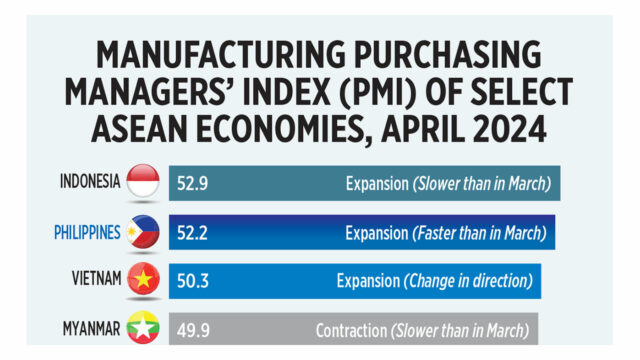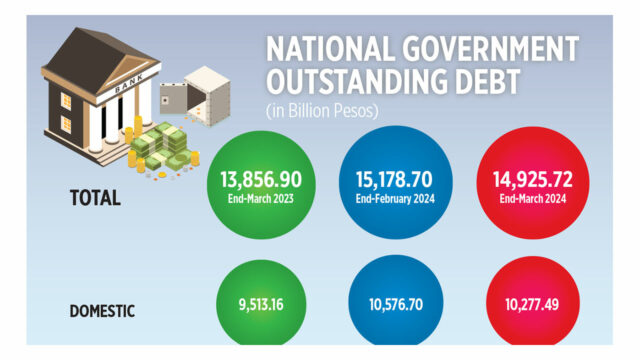BGC celebrates Cinco de Mayo
THERE will be a night of food and fun at Bonifacio South Street on May 4, in celebration of Cinco de Mayo. The street’s restaurants and bars — Bolero, Cochi, Tartufo, Bueno, Wong Place, and Wantusawa — will welcome a live DJ and a mariachi band and dancers. Entrance is free for all as early as 5 p.m. Early birds will also get a free drink at these establishments. Bonifacio Global City’s (BGC) Cinco de Mayo festivities will last from 5 to 10 p.m. on May 4 at the Bonifacio South Street, BGC, Taguig.
Henry Moodie to busk in Manila
POP SINGER Henry Moodie will hold a free busking session on May 4 at Level 3 of the Mall of Asia’s (MOA) Entertainment Mall. He will also participate in an exclusive meet and greet and question and answer with select Filipino music fans who have been supportive of his music journey. Admission to the busking session is free. For more details on the time and location of his performance, visit the MOA social media pages.
FEU bamboo band set for special concert
TO kick off the month of May, the Far Eastern University Center for the Arts and the Far Eastern University (FEU) Bamboo Band are presenting a special concert entitled Ang Tangi Kong Ikaw, on May 4 at 6 p.m. in the FEU Auditorium. It will commemorate the school’s 96th anniversary and the auditorium’s 75th anniversary. The concert will feature some of the most renowned kundiman or Philippine art songs from the past decades, under the supervision of artistic director Norberto Cads, Jr. For further information, visit the Facebook page of the Far Eastern University Bamboo Band.
National Museum holds heritage conservation talks
THE MUSEUM Foundation, in partnership with the National Museum of the Philippines, is presenting a series of talks this month titled “Heritage Conservation: Preserving Our Past for the Future.” The talks will be held at the National Museum Auditorium every Saturday (May 4, 11, 18, and 25). They aim to provide a platform for everyone to engage in insightful discussions about heritage identification, preservation, and protection of cultural, historical, and national heritage sites. On May 4, the topic is “Sacred Spaces: Repaint, Overpaint or Restore” led by Tats Manahan. On May 11, Dr. Gerard Lico will discuss “Conserving Modern Heritage.” On May 18, heritage planning around rivers will be tackled by Paulo Alcazaren in “A Tale of Two Rivers.” Finally, May 25 will have “Law and the Setting for Heritage,” with Mark Evidente as the speaker. Admission to all talks is free.
Rent in Manila
THE THEATER group 9 Works Theatrical presents the latest production of the musical Rent. Set in the 1990s in the middle of the raging HIV/AIDS epidemic, the musical is an updated version of La Boheme and follows a group of society’s outcast and fringe dwellers who find solace and support amongst each other. Directed by Robbie Guevara, it stars Reb Atadero, Anthony Rosald, Jasmine Fitzgerald, Fay Castro, Thea Astley, Garrett Bolden, Lance Reblando, and Markki Stroem. It has performances until June 1 at the Carlos P. Romulo Auditorium, RCBC Plaza, Ayala Ave., Makati. Tickets, ranging from P2,000 to P4,000, are available via Ticket2Me.
K-Culture Next Door fest brings Korea to Manila
THE vibrant world of Korean culture is coming to Manila through the K-Culture Next Door festival, organized by the Korean Cultural Center (KCC) in the Philippines. This year, the festival takes place at the SM Mall of Asia Music Hall on May 4 and 5, and later on at the SM Seaside City Cebu’s Mountain Wing Atrium and Skyhall on June 15 and 16. The opening of the festival on May 4 will see Korea’s top indie rocker Jannabi performing a set. The doors are also open for Filipino individual and group performers, as part of the Mini K-pop Busking Concert. Qualified participants will showcase Filipino talents while embracing their love for K-culture. For more details on the festival events, visit the KCC’s social media pages.
Big Bad Wolf Sale in Cebu to give out more prizes
FOR the final week of the Big Bad Wolf Book Sale in Cebu, a Buy 5 Get 1 free promo is being offered. For every five books purchased, customers get an extra one for free, while also qualifying for a chance to win vouchers. A massive selection of books at low prices await readers until May 5 only. Swedish home furnishing brand Ikea is also treating customers to a chance to win up to P50,000 worth of prizes. For more information about the Big Bad Wolf Book Sale Cebu’s remaining promos for the last few days, visit the fair’s official social media pages.
MMFF 2024 winner Firefly now on Prime Video
GMA Pictures and GMA Public Affairs’ internationally acclaimed film Firefly will now reach more viewers globally on the streaming platform Prime Video. It stars GMA Sparkle child star Euwenn Mikaell as a boy who embarks on a journey to find the mystical island of fireflies from the bedtime stories told by his mother, played by award-winning actress Alessandra de Rossi. Also in the ensemble cast are Ysabel Ortega, Miguel Tanfelix, Cherry Pie Picache, Epy Quizon, Yayo Aguila, and Kokoy de Santos, with Max Collins and Dingdong Dantes. The coming-of-age road trip film is based on the original story of GMA Public Affairs Senior AVP Angeli Atienza and is directed by Zig Dulay. It is out now on Prime Video.
Gabi Na Naman Productions celebrates 9th year
GABI Na Naman Productions (GNN), an events production company, is throwing a birthday party to celebrate nine years of producing local and international shows for the Filipino audience. Dubbed #GNN9, the special showcase will take place at 123 Block in Mandaluyong City on May 25, from 6 p.m. onwards. This year’s edition includes some of GNN’s personal favorites, including UDD, Ang Bandang Shirley, Cheats, Ena Mori, Clara Benin, Gabba, and Chicosci. Tickets to #GNN9 are available via bit.ly/gnn9 for P800 (early bird price).
Warren Hue releases new single
THE 21-YEAR-OLD rising star Warren Hue, fresh from making his mark with the 1999 Write the Future music collective, has dropped his most personal single yet, “SPLIT.” Out now via 88rising with an official music video, it introspectively examines the highs and lows of being in a cross-country relationship. “I wanted to create a song based on split lifestyles and how pressure and insecurity can take over your emotions. Trust is a big theme in the song, telling my significant other to believe in me and vice-versa,” Mr. Hue said in a statement. The day-in-the-life music video captures his lifestyle, a mix of finding his place in a new city and letting loose while pursuing his dreams. The alternative hip-hop track is produced by frequent-collaborator, Chasu. “SPLIT” is out now on all streaming platforms.
Korean crime drama Crash to debut on Disney+
IN Crash, a brand-new Korean police procedural drama, a Traffic Crime Investigation (TCI) team becomes more competitive when a genius new team member joins. A top mathematician with impeccable looks and next to no social skills, Cha Yeonho (played by Lee Minki), is turning things around with the ability to simulate the exact cause of an accident using only the facts and his impressive cognitive abilities. However, an incident from his past comes back to haunt him. Others in the cast are Kwak Sunyoung as team leader Min Sohee and Heo Sungtae as TCI head Jung Chaeman. It starts streaming on Disney+ on May 13.
SEVENTEEN teams up with Spotify for anniversary
K-POP group SEVENTEEN has released their greatest hits album, 17 Is Right Here, commemorating their 9th anniversary. In connection with this, Spotify has also released special content prepared with the group, only available on the platform. This includes a CGI video, behind-the-scenes glimpses, and exclusive events like the ZIP Party, featuring challenges and personal song recommendations from the members. The exclusive digital sharecard for the content will be given to top listeners in the Spotify app.























